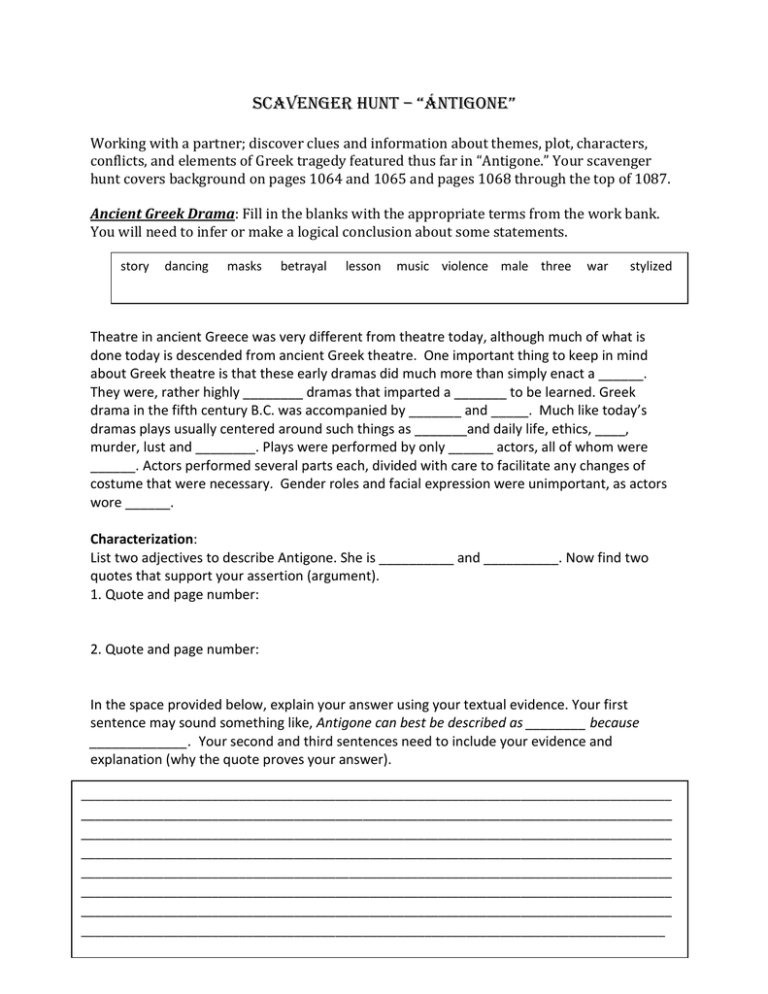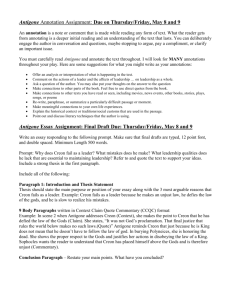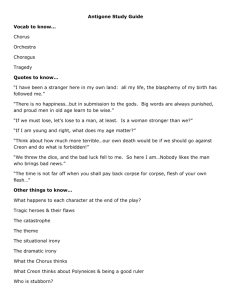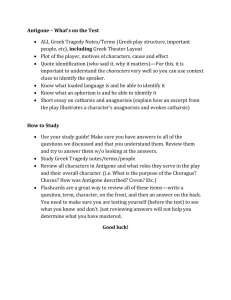Scavenger Hunt * *Ántigone*
advertisement

Scavenger Hunt – “Ántigone” Working with a partner; discover clues and information about themes, plot, characters, conflicts, and elements of Greek tragedy featured thus far in “Antigone.” Your scavenger hunt covers background on pages 1064 and 1065 and pages 1068 through the top of 1087. Ancient Greek Drama: Fill in the blanks with the appropriate terms from the work bank. You will need to infer or make a logical conclusion about some statements. story dancing masks betrayal lesson music violence male three war stylized Theatre in ancient Greece was very different from theatre today, although much of what is done today is descended from ancient Greek theatre. One important thing to keep in mind about Greek theatre is that these early dramas did much more than simply enact a ______. They were, rather highly ________ dramas that imparted a _______ to be learned. Greek drama in the fifth century B.C. was accompanied by _______ and _____. Much like today’s dramas plays usually centered around such things as _______and daily life, ethics, ____, murder, lust and ________. Plays were performed by only ______ actors, all of whom were ______. Actors performed several parts each, divided with care to facilitate any changes of costume that were necessary. Gender roles and facial expression were unimportant, as actors wore ______. Characterization: List two adjectives to describe Antigone. She is __________ and __________. Now find two quotes that support your assertion (argument). 1. Quote and page number: 2. Quote and page number: In the space provided below, explain your answer using your textual evidence. Your first sentence may sound something like, Antigone can best be described as ________ because _____________. Your second and third sentences need to include your evidence and explanation (why the quote proves your answer). ______________________________________________________________________________________ ______________________________________________________________________________________ ______________________________________________________________________________________ ______________________________________________________________________________________ ______________________________________________________________________________________ ______________________________________________________________________________________ ______________________________________________________________________________________ _____________________________________________________________________________________ List two adjectives to describe Creon. He is __________ and __________. Now find two quotes that support your assertion (argument). 1. Quote and page number: 2. Quote and page number: In the space provided below, explain your answer using your textual evidence. Your first sentence may sound something like,Creoncan best be described as ________ because _____________. Your second and third sentences need to include your evidence and explanation (why the quote proves your answer). _____________________________________________________________________________________ _____________________________________________________________________________________ _____________________________________________________________________________________ _____________________________________________________________________________________ _____________________________________________________________________________________ _____________________________________________________________________________________ _____________________________________________________________________________________ _____________________________________________________________________________________ 3. How do both Creon and Antigone fit the definition of a tragic hero? Antigone: Creon: 4. What is the major conflict between Antigone and her uncle, the king? 5. Find a quote that illustrates where Ismene’s greatest loyalty lies from the prologue. Do her loyalties change during Scene 2? Use text evidence to defend your answers. Prologue Quote: Text support from Scene 2: Discovering sensory details: Poets and authors rely on sensory details, words and phrases that appeal the five senses: sight, hearing, touch, taste, and smell. Create a chart and record examples of sensory details from the Parados (pages 1072-1073). Motifs in Drama: Read the margin notes entitled, “Motifs in Drama” information on page 1074. What motif or concept is being addressed in lines 27-30 of Creon’s speech? Find the quote from Antigone’s speech on page 1070 that address the same motif. Find an example (textual evidence) of “dramatic irony.” Refer to the background notes if you need to review dramatic irony. Scene 2. Reread lines 27-31. List two examples of “unnatural events.” What do these events signify? 1. 2. Do you think the sentry’s strongest feelings are for himself or for Antigone? Use text evidence to support your answer. Discuss with your partner lines 110-114 of Scene 2. Write down which statement sums up Creon’s outlook and loyalty. Write the statement which best summarizes Antigone’s position. Creon’s: Antigone’s: What does Antigone’s treatment of her sister reveal about her character? How does Antigone reveal herself to be like Creon? What new plot twist is introduced in line 154? What new issues could arise from the conflict between Antigone and Creon? Open note/book Scene 1 List three characteristics that would/could qualify Creon as the tragic hero. a. b. c. Re-read targeted passage #2 on page 1074 and answer the following questions. 1. What “recent storm” does Creon refer to? 2. Why has Creon called together the chorus? 3. How does he justify his succession to the throne? Read lines 18-30. Why does a clash with Antigone appear to be inevitable considering Creon’s stated loyalty? In what specific ways does the sentry provide “comic relief”? Re-read targeted passage #3 on page 1077 and answer the following questions. How has the body been buried? Why is it important that the ground was dry? Why is it important that the sentries found no sign of a dog or wild animal?




